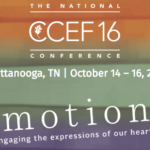Julie did a main session discussing hope. She read out to us: Lamentations 3:19-33 with a reminder that the steadfast love of the Lord never ceases and his mercies never come to an end.
Lamentations reminds us of the importance of mourning over sin and also of mourning over brokenness in our lives. We hear questions such as, “Why? How? God, where are you?” This is grief begging for answers. This is the Biblical language of lament. “Laments give voice to our sufferings and gives permission for us to express our cries and protest the difficulties of our lives.” But lament also gives us a space for hope. Lament doesn’t stop at grief but leads us to hope.
Viktor Frankl, a Holocaust survivor wrote that a man’s deepest desire is to find meaning in life. To get through living in a concentration camp, he used his suffering as opportunity to make himself a better person. It was the answer to “why” he was suffering. Frankel says he who has a “why” to live can bear almost any “how.” We are meaning makers, always trying to make meaning of our suffering.
Frankl says there are 4 ways people deal with trauma at a Concentration Camp.
- People became brutal or cruel to survive.
- Others hope the war would end.
- Others hoped that they get their worldly position back, thinking that once they got out, there would be relatives waiting for them.
- Then there were those that kept an inner beauty.
Trauma and suffering tempt us to put hope in the wrong things. Julie shared about a time her husband helped reorient her to true hope. Julie’s family has gone gone through many hard circumstances. From facing a house fire, to a son losing his vision, to ministry struggles, to failed adoptions. Julie’s husband wrote: “Julie, you will lose every earthly thing you love in this world. It will be taken from you.”
But her husband’s note was encouraging. It helped her to reorient her hope. Julie points out that if you and I make any material thing our ultimate hope, it will certainly shatter. We need a hope that can’t be killed or destroyed. We need a living hope.
Lamentations looks to why and how and who we can find our living hope in. There is hope in God whose mercies are new every morning. Even while the city is still in ruin, we can have hope. “We can let our circumstances inform our view of God or we can let our view of God inform our circumstances.”
Too often hope is described as optimism. It is like keeping your head up. But this hope is only an ambiguous possibility. For some going through suffering, this may be a form of escape to endure suffering but it can not help us survive after getting through. It tethers us to things this world can give us. Worldly hope is rooted in what this world or justice this world can give us. There are things this world can offer us and we should seek such aid, but it can not be what gives us ultimate hope. We are prone to turn to broken cisterns that can not fill us. Yet Hope remains anchored.
Biblical Hope is future oriented. We live for something that is unseen or eternal. Living hope is in the person of Christ. He is the bearers of all griefs. Lamentations speaks of the suffering that is born by one on behalf of many. But not only that, Hope dwells and tabernacles with us. John 1:14.
So the question remains to us today, where do we place our hope? Real hope is rooted in who God is. It is rooted in the knowledge that all will be redeemed and made right some day. Real hope can not be deconstructed! It moves us from surviving to thriving.
Christ’s suffering had purpose and brought us hope. We will have bodies that will be made whole. We will experience peace beyond imagination. Hope can not be the absence of trauma in this life. It must be the presence of a God who redeems and upends. Hope is in God and in what Christ has done for us. How would that change my now? Do we live in a world that demonstrates that we can be content in every circumstance?
Our hope is truly built on nothing less than Jesus blood and righteousness. Those are not platitudes, they are promises. The language of trauma describes our experiences and helps us feel understood. But Scripture give us hope.
In the story of Job, he was not asked to deny his painful circumstances. Job cried out, wore ashes, screamed and fell down… And in all this, Job sinned not! We are not consumed by the fire. Not a fraction of our pain is wasted or unseen. God will take the evil, and it will be undone.
Julie reminded us of John 14:27, which states, “Peace I leave with you; my peace I give to you. Not as the world gives do I give to you. Let not your hearts be troubled, neither let them be afraid.” Julie shared, “The absence of hard things does not guarantee the presence of peace, only a deep foundational hope in God’s goodness can give that for you and I.”
Be encouraged that your story is not over. We have a loving gracious father who will do a good work and he will be faithful to complete it. Your story is in good hands. You and I can experience painful losses and we can thrive, but not just survive… we can thrive beyond measure.
“The wrong hope will inform how you think about your circumstances and it will leave you in pieces. Or Christ your real hope will find you in pieces and move you toward an unmovable peace.” – Julie Lowe
We can not often make sense of suffering this side of heaven. But one thing we can know is that God is always taking our suffering and transforming us more deeply and fully in this image. And that is something we can take with us. “Our suffering is never meaningless if we allow ourselves to be made into his image.” Christ upends our suffering and our trauma.
<< View the other CCEF23 main session summaries here. >>







